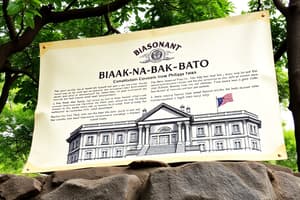Podcast
Questions and Answers
What is the term length for a President elected from the National Assembly?
What is the term length for a President elected from the National Assembly?
- Eight years
- Five years
- Four years
- Six years (correct)
Which of the following is NOT one of the three independent Constitutional Commissions established by the 1987 Constitution?
Which of the following is NOT one of the three independent Constitutional Commissions established by the 1987 Constitution?
- The Commission on Human Rights (CHR) (correct)
- The Commission on Auditing (COA)
- The Commission on Elections (COMELEC)
- The Civil Service Constitution (CSC)
What was the purpose of the constitutional commission created in 1986?
What was the purpose of the constitutional commission created in 1986?
- To draft a new constitution (correct)
- To review local government powers
- To enforce election laws
- To amend the existing constitution
Which office was created to investigate complaints related to public corruption?
Which office was created to investigate complaints related to public corruption?
What significant change did the 1976 amendments introduce regarding the President's role?
What significant change did the 1976 amendments introduce regarding the President's role?
What was the primary purpose of the 1935 Constitution in the Philippines?
What was the primary purpose of the 1935 Constitution in the Philippines?
Which law aimed to establish civil government and end military governance in the Philippines?
Which law aimed to establish civil government and end military governance in the Philippines?
What was the primary purpose of the Biak-na-Bato Republic as established on November 1, 1897?
What was the primary purpose of the Biak-na-Bato Republic as established on November 1, 1897?
Under the 1943 Constitution, who was empowered to elect the president?
Under the 1943 Constitution, who was empowered to elect the president?
What significant change was made to the presidential term in the 1940 amendment?
What significant change was made to the presidential term in the 1940 amendment?
Who were the primary authors of the 1897 Biak-na-Bato Constitution?
Who were the primary authors of the 1897 Biak-na-Bato Constitution?
What role did the PCPI play in the context of the 1943 Constitution?
What role did the PCPI play in the context of the 1943 Constitution?
Which document is referred to as the first important Filipino constitution produced by the people's representatives?
Which document is referred to as the first important Filipino constitution produced by the people's representatives?
What significant political change did the Jones Law of 1916 aim to achieve in the Philippines?
What significant political change did the Jones Law of 1916 aim to achieve in the Philippines?
Who had the authority to appoint members of the Supreme Court according to the 1935 Constitution?
Who had the authority to appoint members of the Supreme Court according to the 1935 Constitution?
What major political event allowed for the establishment of the 1973 Constitution?
What major political event allowed for the establishment of the 1973 Constitution?
Which body was vested with the power of the Republic under the 1897 Biak-na-Bato Constitution?
Which body was vested with the power of the Republic under the 1897 Biak-na-Bato Constitution?
Who drafted the 1899 Malolos Constitution?
Who drafted the 1899 Malolos Constitution?
What was one of the significant requirements introduced by the 1943 Constitution regarding language?
What was one of the significant requirements introduced by the 1943 Constitution regarding language?
What was the date when the Malolos Constitution was approved?
What was the date when the Malolos Constitution was approved?
Which of the following officers was NOT associated with the Malolos Constitution?
Which of the following officers was NOT associated with the Malolos Constitution?
Flashcards
Biak-na-Bato Republic Constitution
Biak-na-Bato Republic Constitution
First Philippine republic, established in 1897, with a governing body called the Supreme Council.
Malolos Constitution
Malolos Constitution
Philippines' first significant constitution, drafted in 1899, establishing a democratic republic.
1935 Constitution
1935 Constitution
Foundation of the Commonwealth government, a temporary government leading to Philippine independence.
1943 Constitution
1943 Constitution
Signup and view all the flashcards
1973 Constitution
1973 Constitution
Signup and view all the flashcards
1987 Constitution
1987 Constitution
Signup and view all the flashcards
Supreme Council (Biak-na-Bato)
Supreme Council (Biak-na-Bato)
Signup and view all the flashcards
Asamblea de Representantes
Asamblea de Representantes
Signup and view all the flashcards
Malolos Congress
Malolos Congress
Signup and view all the flashcards
Philippine Bill of 1901
Philippine Bill of 1901
Signup and view all the flashcards
Jones Law of 1916
Jones Law of 1916
Signup and view all the flashcards
Hare-Hawes Cutting Bill
Hare-Hawes Cutting Bill
Signup and view all the flashcards
Tydings-McDuffie Act
Tydings-McDuffie Act
Signup and view all the flashcards
Bicameral Congress
Bicameral Congress
Signup and view all the flashcards
Commission on Appointments
Commission on Appointments
Signup and view all the flashcards
Preparatory Commission for Philippine Independence (PCPI)
Preparatory Commission for Philippine Independence (PCPI)
Signup and view all the flashcards
Kapisanan sa Paglilingkod sa Bagong Pilipinas (KALIBAPI)
Kapisanan sa Paglilingkod sa Bagong Pilipinas (KALIBAPI)
Signup and view all the flashcards
Office of the Ombudsman
Office of the Ombudsman
Signup and view all the flashcards
Constitutional Commissions
Constitutional Commissions
Signup and view all the flashcards
Study Notes
The Biak-na-Bato Constitution
- The Biak-na-Bato Republic was established in San Miguel de Mayumo, Bulacan on November 1, 1897.
- The constitution was drafted by Isabelo Artacho and Félix Ferrer.
- The Supreme Council was the governing body, headed by the president and four department secretaries: Interior, Foreign Affairs, Treasury, and War.
- The Consejo Supremo de Gracia y Justicia had the authority to make decisions and affirm or disprove sentences.
- The Asamblea de Representates was to be formed after the revolution to create a new constitution and elect a new Council of Government and Representatives of the people.
The Malolos Constitution
- The Malolos Constitution was the first important Filipino document created by representatives of the people.
- It's rooted in democratic traditions with influence from American soil.
- Felipe G. Calderon drafted the constitution in 1899.
- It was approved by delegates to the Malolos Congress on January 20, 1899, in Barasoain.
- Executive powers were vested in the president and his cabinet.
- Legislative power was exercised by the Assembly of Representatives.
- Judicial powers were delegated to the Supreme Court and other lower courts established by law.
The 1935 Constitution
- The 1935 Constitution established the basis of the Commonwealth government which was a transition government before Philippine independence.
- The Philippine Bill of 1901 ended military rule and established a civil government.
- The Jones Law of 1916 enabled Filipinos to govern themselves better and led to the establishment of the First Philippine Assembly.
- The Hare-Hawes Cutting Bill of 1933 outlined a ten-year transition period before Philippine independence.
- The Tydings-McDuffie Act, slightly amended from the Hare-Hawes Cutting Bill, served as the framework for crafting the 1935 Constitution.
- The President was elected by the people for a six-year term but changed to four years with re-election under a 1940 amendment.
- The Bicameral Congress included the Senate and House of Representatives.
- The President appointed members of the Supreme Court with the consent of the Commission on Appointments of the National Assembly.
The 1943 Constitution
- The 1943 Constitution was established under the Japanese-sponsored Second Republic of the Philippines.
- It was crafted by the Preparatory Commission for Philippine Independence (PCPI) and endorsed by the Kapisanan sa Paglilingkod sa Bagong Pilipinas (KALIBAPI), a pro-Japanese political party.
- Executive power was vested in the president elected by the National Assembly.
- Judicial powers were exercised by the Supreme Court and other lower courts.
- The Constitution promoted Tagalog as the national language and called for a new constitution to replace it after the war.
The 1973 Constitution
- The 1973 Constitution was utilized by the Marcos regime to maintain its power.
- Martial law was declared on September 21, 1972.
- The Prime Minister elected from the National Assembly served as the head of government and commander-in-chief.
- The President, also elected from the National Assembly, was the symbolic head of state with a six-year term.
- The National Assembly defined the jurisdiction of the lower courts.
- The 1976 amendments replaced the Interim National Assembly with the Interim Batasang Pambansa.
- The President combined Prime Minister positions and exercised legislative powers until martial law was lifted.
The 1987 Constitution
- The 1987 Constitution is the current fundamental law of the Philippines.
- It was drafted by a constitutional commission with 48 members from various sectors following the 1986 People Power Revolution.
- The Constitution declares the Philippines a “Democratic Republican State”.
- It established three independent Constitutional Commissions:
- Civil Service Commission (CSC) - manages government personnel.
- Commission on Elections (COMELEC) - enforces election laws.
- Commission on Audit (COA) - audits government funds and transactions.
- The Office of the Ombudsman was created to investigate corruption within the government.
Studying That Suits You
Use AI to generate personalized quizzes and flashcards to suit your learning preferences.




